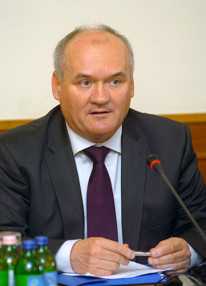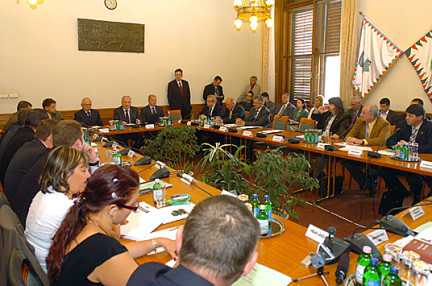Csaba Hende Supported By The Defence Committee
Szöveg: Ádám Draveczki-Ury | 2010. május 29. 8:46The Defence and Internal Security Committee of the National Assembly has supported the appointment of defence minister Csaba Hende with 13 votes in favour and 2 against. The minister designate said by relying on the dedicated work of troops, the entire system of the Hungarian Defence Forces has to be renewed.
Csaba Hende, the candidate for defence minister in the second Orbán cabinet arrived to the meeting of Parliament’s Defence and Internal Security Committee with István Simicskó and retired General Lajos Fodor, his future nominees for state secretary. Similarly to the Tuesday hearing before the National Security Committee, the procedure started with the candidate’s brief introduction. Csaba Hende said he joined the MoD in 1991 at the request of defence minister Lajos Für, where in the first year he was working as a parliamentary secretary and in the second year he became the head of the legal and administrative department. Following that, he was working as secretary to the cabinet, i.e. the ministry’s chief of staff. The candidate minister added: he also participated in the elaboration, six-party negotiations, and enactment of the Home Defence Act of 1993, born in this period. It passed with a more than 99 per cent majority vote, which is unprecedented and also impressive because they managed to enact a comprehensive sectoral code only a few months before the1994 election campaign – Csaba Hende underlined.
Internal cohesion

Csaba Hende underlined he wishes to begin his ministerial activities with rapid and profound decisions in order that the defence forces can catch up with foreign allies in the spirit of international military traditions, patriotic and honest feelings. “The first step will be the thorough financial review of the Hungarian Defence Forces and the Ministry of Defence," he said. Improving the deployability of the military and laying the new foundations of officer training and further education will also be top priorities. The candidate minister said the development of the equipment of troops in crisis management operations and missions, in compliance with the armaments of the allies is another highly important area. “Outdated equipments have to be replaced," Csaba Hende pointed out.
The candidate for defence minister said Hungary will be an active participant in the military activities of NATO and the European Union, with due regard to national interests. He also underlined that during Hungary’s 2011 EU presidency, they will make efforts to reinforce the military and crisis management capabilities of the EU. As regards the new command structure, he pledged a simple, transparent system operating with less bureaucracy and mentioned the development of the reservist system as one of the factors to contribute to the social recognition of the defence forces and to the recruitment of more personnel. The committee was told that a new HR strategy will also be drawn up, where progress will be based on performance and achievements. Csaba Hende also stressed the importance of a predictable career model and finding the healthy proportion of personnel. The minister designate cited the defence forces’ intensifying connections with society, teaching defence studies, more profound patriotic education and the importance of preserving military heritage as priority objectives in the areas of which they will also cooperate with the social organisations concerned.
Unbending rigour and patriotic education
"By every means. With an iron hand, with unbending rigour," was Csaba Hende’s answer to the question of MP Gábor Tóth, Fidesz (Young Democrats’ Alliance) about his plans for acting against corruption. "First we must focus on closing inquiries already in progress and naming those who are guilty," said the candidate, also pointing out that the spirit of the old hussar salutation ’Strength, honour!’ has to be restored on every level. Like he said later at the hearing, it is unprecedented that generals and colonels are taken away in shackles from their places of duty. "I am afraid it is only the tip of the iceberg, but I will do my best to take the whole iceberg out of our little lake," said the minister designate. "In a society it is natural that the military is the pride of the nation, therefore we have to increase the defence forces’ recognition," said Csaba Hende, who told the committee that their objective is to make the military profession one of the most attractive careers for life in the future. "A predictable, performance and achievement-based promotion scheme is one of the main points of stabilisation," he said, adding that in the future he wants to put an end to the inflation of ranks as well.
In response to the Fidesz MP’s question about patriotic education, Csaba Hende once again confirmed his commitment to get in contact with the youth, highlighting that new opportunities have to be created for them to make themselves acquainted even with military-related technical sports such as shooting, aviation or parachuting. The minister designate also said the government is not planning to introduce mandatory defence education. "We trust the patriotic commitment of young people more than imposing bad-tasting obligations," said Csaba Hende.
Zsolt Endrésik, Jobbik (Movement for a better Hungary) asked whether it is possible to reach the 1.81 per cent target for the Hungarian defence budget, as agreed at the NATO summit in Prague. “Following consultations with the allies, the government decision on the implementation of the National Military Strategy has reduced it to 1.3 per cent," Csaba Hende reminded the committee, underlining that today we often hear 1.1 per cent for 2010 but if we deduct the budget of the State Medical Centre the total amount does not even reach 1 per cent. “We have not received the key to the cash register yet, therefore at the moment I cannot inform you about the real picture", he said. Concerning a possible troop surge in the defence forces of which the maximum number of personnel is 40,000 at the moment the minister designate reminded the committee that this issue falls within the scope of authority of the National Assembly and there are quite a lot of factors that influence optimal staff numbers. “It is not worth starting a ’war of numbers’ in this topic," he said.
In response to MP Gergõ Balla’s (Jobbik) questions about a reservist system Csaba Hende said in his opinion back then compulsory enlistment was put an end to in a way that was in many respect rapid and unprepared, and these changes concerned enlisted men and reservists as well. “Currently there is no data of citizens liable to military service in an emergency, which is a very unfortunate situation," he said, emphasising that the deployment of the 4000-strong reservist force set forth in a parliament decision put forward by the outgoing government may mean serious help in many areas for the defence forces in the future.
In his answer to Barnabás Tamás’s (Fidesz) question Csaba Hende confirmed: the replacement of outdated equipments cannot happen ‘at one stroke’. “Priorities should be identified even though ‘our shoes are tight in many places’, therefore we cannot lean back," he said, citing the vehicle fleet, missile technology, ammunition and armaments.
Tamás Barnabás also inquired whether the candidate considered it acceptable that there are more than one military facilities which are guarded by security companies. "Several facilities are guarded by the Hungarian Defence Forces, a bit more than that are guarded by armed security services, and in other places there are also soldiers on a symbolic guard," said the minister designate. "I think it is not a good message if barracks are guarded by ladies in black overalls, some of whom are a bit older and overweight, with a holster round their waist, but this is a matter of financing and personnel numbers," added Csaba Hende, in the opinion of whom with the current number of personnel it is not possible to guard each military facility by soliders. He asked for the patience and understanding of everyone in this question for the time being.

István Göndör, MSZP (Hungarian Socialist Party) inquired about the cooperation with our neighbours, underlining that this topic had not even come up at the hearing. In his response Csaba Hende gave exercise Clever Ferret 2010 as an example. "I am in favour of strengthening cooperation and camaraderie in the region. We have been saying since 1990 that Hungary does not have an enemy image in the region, but quietly, between ourselves, let us ask the question once: I wonder whether Hungary is an enemy image for others?", he asked, pointing out that the chance of a traditional armed conflict is very small in the region but one can never preclude the possibility of anything. "If someone had said in 1904 that in ten years, the whole world would be in flames, he would have been a laughingstock. Wars break out unexpectedly." In response to another question from the Socialist MP, Csaba Hende said he speaks fluent German and he has recently completed an upper intermediate English course. "I am not familiar enough with the English military terminology yet," he added.
Finally, with 13 votes in favour and 2 against, the committee has supported the appointment of Csaba Hende as minister of defence. The new cabinet will be sworn in Saturday afternoon.
Related article:
Appointment of Csaba Hende supported by National Security Committee